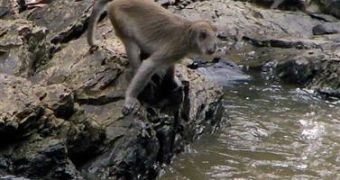Although this is not the first time when a species of monkeys are spotted fishing in rivers, the discovery of a silver-haired primate in Indonesia which exhibits similar behavior is definitely a first. In the last eight years alone on at least four occasions researchers have observed long-tailed macaques capturing fish with their bare hands in the East Kalimantan and North Sumatra rivers of Indonesia. The silver-haired primate recently found fishing is mostly known for having a diet consisting of fruit, crabs and insects.
"It's exciting that after such a long time you see new behavior. It's an indication of how little we know about the species.", said Erik Meijaard of The Nature Conservancy group, co-author of the study detailing the discovery. However, what triggers this behavior in monkeys is mostly unknown, especially considering that long-tailed macaques are far from lacking food resources. Meijaard believes that it's their capability to adapt to environmental changes that determined their shift in eating habits.
"They are a survivor species which has the knowledge to cope with difficult conditions. This behavior potentially symbolizes that ecological flexibility", Meijaard added. Other primates showing fishing behavior include chacma baboons, olive baboons, Japanese macaques, chimpanzees and orangutans.
"It was not surprising to me because they are very adaptive. If you provide them with an opportunity to get something tasty, they will do their best to get it", said Agustin Fuentes anthropology professor at the University of Notre Dame, who studies long-tailed macaques on the Indonesian island of Bali and in Singapore.
According to Fuentes, long-tailed macaques have also been spotted fishing in Bali, where they were flooding paddy fields in order to capture frogs and crabs. This behavior could be evidence that monkeys could survive both in urban and rural areas, thus reducing the risk of becoming endangered and ultimately extinct. Most of the primates on the globe today don't live life as well as they did some time ago, while macaques appear to be better than ever. "We should learn what they do successfully in relation to other species", Fuentes said. The true meaning of the exhibited behavior on the other hand needs to be further studied.
Long-tailed macaques have been observed fishing twice, in 1998 and in 2007, by Serge Wich of the Great Ape Trust, one of the authors of the study, and by The Nature Conservancy researchers. Apparently Wich didn't even realize what he had witnessed back in 1998, until Meijaard revealed his own discovery.
"I was astonished. I thought it was a normal observation. I was really surprised because it indicated to me that you keep on making these observations about primates but you only discover they are interesting when you compare them with others", Wich said.
The fishing habits could be determined by the lack of food, droughts or even the destruction of food sources, albeit until further studies are conducted nothing is certain. Meijaard said that in dry years some macaques have been spotted while making use of alternative food sources, like insects, bark or leaves, which are not regularly found in their diets. Also, in two different groups young monkeys have been spotted learning from their elders and then trying for themselves, which indicates that the behavior is not isolated to a certain group only.
"What I feel is most interesting about the observations of fishing is the possibility of documenting whether and how this novel behavior is passed or transmitted through the population", said Paul Garbner of the University of Illinois.

 14 DAY TRIAL //
14 DAY TRIAL //